5 Critical Life Lessons Taught by Video Games
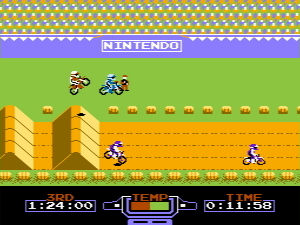 | | This is what made me the champion dirtbike racer I am today |
My generation is probably the first to be raised by video games. I was learning to talk around the same time I was learning to play Pac-Man on the Atari, and though I can't remember the first time I visited Disney World, I have vivid memories of the first time I played the newly released Nintendo Entertainment System at a neighbor's birthday party. For years afterward, most of the friends I acquired shared a bond that was gaming, and it has always been an important--if not defining--aspect of my life. Even as a fully-grown adult approaching 40, I have to admit I'm a video game addict.
Still, my generation hasn't been as ruined by video games as many of the naysayers thought we would be. We haven't become violent sociopaths who take mushrooms to feel big and assume we can get away with anything because we have multiple lives. Any of us who did turn out that way probably aren't around anymore, but looking at the statistics, we're no more narcissistic or prone to an early grave than the generations that preceded us. Indeed, video games have taught us some important facts about life, things that have prepared us to deal with the world as healthy, mature, and fully-functioning adults. Here are just five such lessons, things we never learned in school but which have informed our lives in positive ways.
Any Door Can Be Opened with the Right Key
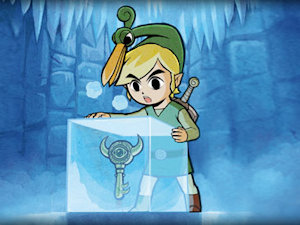 | | Of course, you need a fire arrow first, which you can only get after you beat the lava dungeon, which you can only reach once you've unlocked the three power stones, which you can only find after acquiring the deku leaf, which you get from the old man in Kakiriko Village after nightfall on the second day |
Link might casually walk into a stranger's home, break all the pots, steal all the money, and then leave without so much as an apology, but he is also keenly aware that the obstacles in his path can all be conquered, as long as he develops the proper skills and has the proper tools. If he comes across a locked door between himself and his goal, he knows that, rather than trying to break the door down, he must go back and find the key that will open it.
Other difficulties can be met with the same attitude. If there's an area you can't reach because it's surrounded by water, go find something that'll help you swim or otherwise get across. If the cave you're in is too dark to see, maybe you need to find a candle somewhere. And so on. It's an obligatory mechanic in most RPG-style games, and it prepares kids for a life of challenges. We gamers learn that, like Link, we can overcome life's myriad difficulties with experience and patience. Also, we know to never mess with chickens.
Goals Take Time, and You Should Expect Setbacks
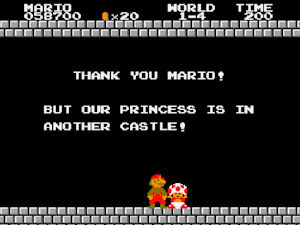 | | Mario did all that just to save a guy in a diaper and a mushroom hat |
You've got to feel for Mario. He traverses hostile lands for his love, squeezes through sewer pipes, conquers small castles, moves through underground caverns, and even leaps over spitting lakes of boiling lava to murder a monsterous fire-breathing demon turtle. Then, bruised, battered, and probably coughing up soot, he reaches the chamber where he thinks she is being held captive only to be greeted by a little toadstool man who informs him that he's totally at the wrong castle.
Unless he finds difficult-to-unearth shortcuts, Mario will undergo this trial seven more times before finally finding his princess, and that takes an amazing amount of endurance, patience, and determination. Life is like that in a lot of ways. Anything worth doing is going to be hard work, and life is going to try to beat you down with enormous setbacks that feel like they're taking you back to where you started. Still, like Mario, if you persevere through it all, you will eventually reach your goal. Also, if you're privileged enough, you'll know where all the warp zones are.
Accomplishment is Best When It's Hard to Earn
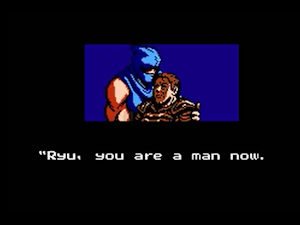 | | Worth it |
Ryu Hayabusa is a young ninja trying to earn justice for his father only to realize there's a sinister plot underway that threatens the entire world. He must hone his skills to a razor sharp point to become the Ninja Gaiden and save us all from the forces of evil, and such an enormous task only feels real if it feels appropriately impossible. What, did you think saving the world was easy because Bruce Willis does it every Christmas?
Those of us who managed to get through the blood, sweat, tears, and broken controllers required to complete Ryu's journey wear their victory into adulthood as a badge of honor. If someone says they broke up a terrorist plot last week, we can say, "So what? I beat Ninja Gaiden." While it may have been fun to beat less difficult games like Kirby, nothing feels as rewarding as finishing a game that taxes your very soul--Ninja Gaiden is hardly the only example here--and thus we know, in life, we can only take real pride in things that are nearly impossible and we shouldn't boast too much about the little things.
You Are Not the Best at Anything
 | | And there's always a Lakitu looking down on you for it |
Even if you've conquered the likes of Ninja Gaiden, Battletoads, Ghosts 'n Goblins, and more, games will still teach you humility through leaderboards, multiplayer matches, and no damage speedrun videos. No matter how good you are, there's almost certainly somebody better than you. Your parents might want you to believe that you're a special chosen one destined for greatness, but when you see that your best moves only rank you around the 27,320th best in the United States, you'll realize just how foolish it is to have an inflated ego. I can confidently say I'll probably beat the snot out of you in Mario Kart 64 if you want to come to my house and challenge me, but if I play an online match of Mario Kart 8, I'll be lucky to place in the top five or six.
Humility is an essential trait to have in life, and I can think of no clearer way to learn it than by taking the time and energy to "master" a video game before going online and seeing how many people are insanely better than you at that same game. In life, you have to go above and beyond the average just to get noticed, and if you want to be a success in your field, you have to have a realistic understanding of how many people there are in your field and how many of them are probably more suited to success than you are. Only then can you do what you need to do to get to their level.
Character is Vital, and It Gradually Gets Harder to Change
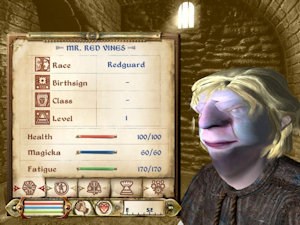 | | Unfortunately, you're pretty much stuck with your looks for the whole game |
The first time I played The Elder Scrolls, I chose to build a character who was good at bareknuckle brawling, conjuring magic, and heavy armor. However, after spending a few hours trying to beat my enemies into submission while overburdened by ridiculously heavy equipment and a virtually useless ability to conjure a pathetic energy shield, I remembered that I tend to play my RPG games with more stealth and long-distance tactics. Refusing to start over, I was nonetheless able to slowly morph my character into something completely different from its starting point, but it took a lot of effort. After literally a hundred more hours of playtime, I developed a sneaky little devil who wore quiet, light armor and weilded a killer bow and arrow tipped with poisons only a master alchemist can cook up. If, at that point, I wanted to go back to being a brute who could conjure stuff out of thin air, it would have been even harder than my original transformation, if not impossible.
Life is kind of like that. We all have our strengths and weaknesses, but when we're young, we have enough time and energy to mold ourselves into whatever we want to be, at least within reason. However, as we get older, hone our abilities, and harden our character traits, it gets more and more difficult to change course. It's important to realize this at a young age, and it's not something I was able to learn from my teachers or my parents. No, this is a lesson almost exclusively taught by video games.
Life is full of challenges, and I'm not trying to argue that you can learn everything you need to know from video games alone. However, far from being a stunting force on the development of impressionable minds, video games can be a positive influence with many important things to convey. They don't have to be strictly educational to teach these lessons, and the good they can do--as merely one piece of a child's everyday life--outweighs the potential harm. Of course kids should still go to school, listen to their parents, and go outside from time to time, but if they want to spend an hour or two with their parent's gaming machine, the parent shouldn't be afraid to say yes. It might just make the kids better human beings in the long run.
-e. magill 9/28/2017
|
|